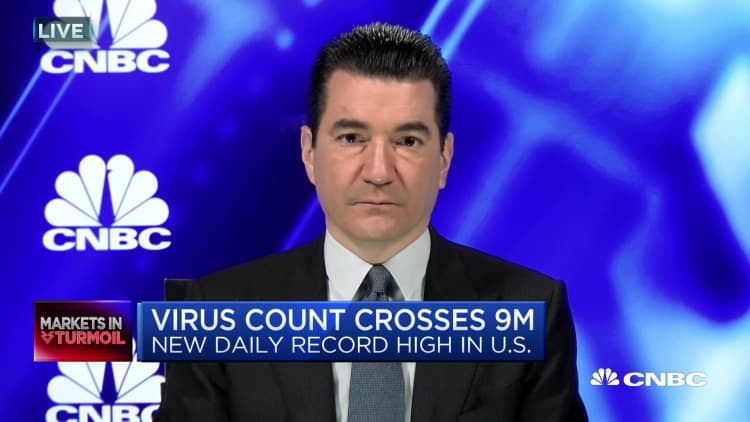As a group, Medicare beneficiaries generally share at least one thing: Covid-19 risk.
Most of the program's 62.8 million recipients are age 65 or older, making them more likely to develop complications from the virus or succumb to it, according to the Centers for Disease Control and Prevention. Recent agency data shows that of 217,000-plus Covid deaths in the U.S., nearly 172,000 were in that age group.
That risk was explored in a recent survey of about 2,100 Medicare beneficiaries by eHealth, an online insurance marketplace. When it came to policy issues (e.g., whether the government is doing enough to lower prescription drug costs), viewpoints were most often split along political party lines. Respondents generally showed more agreement about trying to remain healthy during the pandemic.

For example, a majority of both Democrat (98%) and Republican (69%) respondents said masks should be mandatory in public when social distancing is not possible. That's nearly unchanged from eHealth's July poll (98% and 70%).
"While we found some divergences on issues of policy, when it comes to guarding their own health, both sides of the aisle seem to have a lot in common," said Andrew Shea, senior vice president at eHealthMedicare.com.
The survey was conducted Oct. 23 to 26. More than 50% of respondents said their household income was $50,000 or less.
Here's what respondents think about the virus, including prevention and treatment, as well as how Medicare should factor into coverage.
Exposure to Covid
A third of respondents said they are "very worried" about exposure to the coronavirus and 52% say they are "somewhat worried." Another 19% say they are "not worried at all" about being exposed.
Yet if they were to contract Covid, 46% said they are very worried about being hospitalized, 35% are somewhat worried and 18% aren't worried.
If you're a Medicare beneficiary and get the virus, the associated costs could vary widely, depending on both your specific coverage and the required treatment.
More from Personal Finance:
Avoid making these big investing mistakes
Older workers struggle to find jobs during pandemic
How to handle an unexpected inheritance
"In my experience, most people with Medicare — like all Americans — are unable to estimate the cost of their care before it is rendered," Shea said.
Of the 1 million cases among Medicare beneficiaries through Aug. 15, more than 284,000 of those involved hospitalizations, according to preliminary data from the Centers for Medicare and Medicaid Services. Almost half (49%) of those stays lasted one to seven days; roughly 5% involved more than 30 days.
If you have only basic Medicare, you'd face a $1,408 deductible this year (under Part A) if you are admitted to the hospital. You'd also generally pay 20% of services delivered through Part B after you meet a $198 (2020) deductible. That would include providers who tend to you during your inpatient status.
In my experience, most people with Medicare — like all Americans — are unable to estimate the cost of their care before it is rendered.Andrew SheaSenior vice president at eHealthMedicare.com
For those with Medicare supplement insurance (aka "Medigap"), some of those costs may be fully or partially covered, depending on which plan you have. However, these policies do not pick up any expenses related to Part D, which is prescription drug coverage.
Meanwhile, if you get your benefits delivered through an Advantage Plan, the cost for a hospital stay will depend on the cost structure.
"Most people with a Medicare Advantage Plan pay a fixed copay for every night they are in the hospital, and fixed copays for medical care provided in the hospital," Shea said.
Additionally, unlike basic Medicare, Advantage Plans come with annual out-of-pocket maximums. In 2021, that can be as much as $7,550 for in-network services.
This year, however, many Advantage Plans have waived the cost-sharing involved in treating Covid, at least temporarily, while others have eliminated other certain copays regardless of the reason.

On the issue of treatment
More than half (53%) of survey respondents said they are either "very" or "somewhat" comfortable getting a vaccine if one were to be made available at some point this winter. That's down from 63% in eHealth's July poll.
If a vaccine is approved soon, it would likely be through so-called emergency-use authorization from the Food and Drug Administration. Late last month, a federal rule was adopted to allow Medicare to fully cover the cost of an inoculation sanctioned via that route. Without the change, beneficiaries would only get coverage if the vaccine went through the full, lengthy approval process for new biologics.
Meanwhile, 40% of respondents in the survey said they would want the option to use experimental or unproven treatments if they come down with the virus. Nearly a quarter (23%) said they would not and 37% were unsure.
"Typically, Medicare does not cover investigational/experimental therapies, but the availability of treatments for Covid-19 authorized by emergency-use authorization is pushing the boundaries," said Juliette Cubanski, deputy director for the Kaiser Family Foundation's program on Medicare policy.
For example, Medicare has paid for hospital stays involving remdesivir — an anti-viral medication used to battle severe Covid cases — even when only available under emergency use, Cubanski said. (It is covered under Part A.) Additionally, the Centers for Medicare and Medicaid Services recently released a rule specifying that Medicare will cover certain treatments made available through such early approval, she said.
"That suggests to me that Medicare coverage for [emergency-use authorized treatments] is an issue of concern … and they are actively trying to ensure coverage will be provided," Cubanski said.


